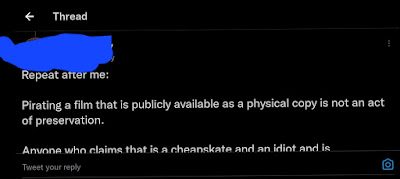I've occasionally seen some hostility from people and groups that run for profit ventures using public domain material to other people using the same material. Accusations of piracy and financial damage and ingratitude. I mostly archive and share but on occasion have edited and cleaned up some films, removed watermarks, added subtitles and score, re-encoded to improve picture quality and so on. It can take a lot of time and energy. So I do understand and sympathise with others who have done some restoration work and feel they aren't being appreciated fully.
But that said you can't dictate the attitude of the general public. IP projects also take a lot of work and time and even money to make, corporations are not people but the work they do involves quite a lot of people. So that the work is voluntary or for profit but on a smaller scale doesn't automatically command a set amount of appreciation. Though I do encourage people to make their appreciation more apparent if they do value or enjoy someone else's efforts, I can say from experience that it does make a difference.
As for piracy, I'm sorry but that's simply not applicable. Why is copying and sharing called piracy? 17th century Buccaneers didn't sail up to a Spanish trade Galleon in the Caribbean, copy it and its cargo and then sale it to port and let others do the same. They bore down and seized the ship with violence or the threat of violence and on occasion attacked the crew to boot. The reason why torrenting a e-book or sending friends mp3s over e-mail or a shared folder is called piracy is partly propaganda, while the violence of the pirates was exaggerated media corporations were keen to associate these practices with negative legacy of the black flag fleets. The justification for the connection was that while physically speaking nothing was being stolen, theft was still occurring because you were violating the intellectual property of the legitimate owners. And here's the thing with public domain works, since every single person is the owner of them, effectively speaking ownership dissolves as there is no way to enforce or define that relationship.
While I'm sure it stings emotionally to see something you've worked on get shared in ways you didn't consent to, legally and in my view morally there's nothing that can be done. Cleaning up the audio or re-encoding to make the image a little crisper or submitting an alternate soundtrack (if that soundtrack is also in the public domain) doesn't entitle you to enforce exclusive access to it. So, no anyone calling a situation like this piracy either has been misinformed as to what piracy is, or is simply trying to use the power of shaming to make their case for them.
On the preservation angle that quite a few of these arguments revolve around. For profit boutique releases aid preservation and by impacting on their ways of making profit people threaten to make these things obscure and rare again. There are two major flaws here, first the onus is on them to provide evidence that these limited releases do improve preservation, I've personally eagerly awaited several of these releases, failed to get hold of a copy and seen the film go back into obscurity for years until someone rips their copy and starts sharing it on the web. A limited release at best provides a small chance that future generations will rediscover them at some point. If you make special editions or improved versions of old public domain films and seriously wish to support preservation the best thing you could do is send it to one of the major national archives like the Library of Congress or the British Film Institute, as they're the only ones with the resources and setup to maintain and preserve it with any degree of security for the future.
Many television shows that are lost partially or in their entirety sold there episodes in physical form to tv stations around the world, it was no protection from trashing, getting lost, wearing out, war and riots in some cases, censorship etc.
And while we're on the subject, preservation for what purpose? If the object is simple create a physical product to keep locked away for ever, then preservation is a waste of time and resources. I find it to be much more worthwhile to preserve these films for the benefit of the public, which requires extensive sharing and duplication. There are many business practices that these limited and "boutique" producers employ that effectively shutout all but a few, or would do if we all respected their attempts to salvage a business strategy based on artificial scarcity.
Preservation is only one of the important functions of the public domain. The public domain does not exist so things can last forever, its importance is that in given ownership to everyone it enables everyone if they're willing to re-use and take inspiration from them to make new things and enrich culture further. To those who got into the public domain because they dreamed of becoming millionaires selling dvds of Chaplain and Buster Keaton and WWII cartoons, I'm sorry but you've picked a terrible business plan. It is possible to make money out of the public domain and seeking compensation for work and effort is no crime, but you have to accept reality, the only ones who can make a go of this are the bigger labels and even they use the public domain as an auxiliary source of income.




No comments:
Post a Comment